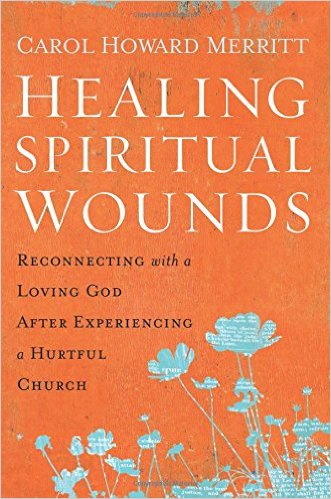 Carol Howard Merritt has spent much of her life, and certainly much of her recent years as a PCUSA clergy-person and pastor, trying to help those who are drifting from the church, or who have turned their back on religion altogether. Her first two widely acclaimed books — Tribal Church and Reframing Hope, published several years ago by the Alban Institute — were studies of how mainline churches might minister more effectively to young adults, perhaps especially those then with that Counting Crows-angsty Gen X ethos. Her new book, Healing Spiritual Wounds: Reconnecting with a Loving God After Experiencing A Hurtful Church (HarperOne; $25.99) even if it doesn’t answer all the questions, or point to all the necessary answers, is a very valuable volume for anyone of any age who has been hurt by bad faith and I hope it is widely read. It is important.
Carol Howard Merritt has spent much of her life, and certainly much of her recent years as a PCUSA clergy-person and pastor, trying to help those who are drifting from the church, or who have turned their back on religion altogether. Her first two widely acclaimed books — Tribal Church and Reframing Hope, published several years ago by the Alban Institute — were studies of how mainline churches might minister more effectively to young adults, perhaps especially those then with that Counting Crows-angsty Gen X ethos. Her new book, Healing Spiritual Wounds: Reconnecting with a Loving God After Experiencing A Hurtful Church (HarperOne; $25.99) even if it doesn’t answer all the questions, or point to all the necessary answers, is a very valuable volume for anyone of any age who has been hurt by bad faith and I hope it is widely read. It is important.
That organized religion can get weird and people have been hurt by churches is nothing new. Petty personality squabbles in the local congregation and inter-denominational doctrinal disputes are legendary for driving ordinary folks from church life. More is going on, of course, to cause church decline. The pressures of modernity pressing down upon us in the way we do life and construe meaning – the history of how we got to the early 21st century in this regard is told quickly and vitally in chapter two of Rod Dreher’s The Benedict Option and is pondered deeply in James K.A. Smith’s Now (Not) To Be Secular: Reading Charles Taylor. I think Os Guinness’s book The Impossible People: Christian Courage and the Struggle for the Soul of Civilization, although written to exhort us to deeper faithfulness within our tumultuous times, gives an excellent overview of the cultural pressures leading many to abandon faith.
Although I have a hunch its prevalence is sometimes overstated, perhaps even in Healing Spiritual Wounds, we all know that church-life and the presentation of the Christian faith has been hurtful to some. Perhaps you have experienced it yourself. I know that many of us have felt odd in church groups and ministry organizations for not towing a certain line here or there. Even earnestly, well-intended presentations of faith can offer images of God and practices of Christian living that are unsettling and sometimes have ugly consequences. The Bible itself, even, presents many troubling stories and reading it well is tricky. Even when the tone of a church or ministry’s faith formation teaching isn’t demeaning or rude, it can be demanding and for some that is sometimes unpleasant. Some of us are seen as too liberal for theologically conservatives circles but at the same time too traditional for liberal groups and even though that simplistic way of saying it isn’t quite right, it reminds me that fitting well into a religious group is sometimes tricky, even for those who are resilient and not faced with severe religious trauma. It can be painful. Of course, a heavy handed and harsh view of the Bible which demands complete compliance with what one group says are the true doctrines is sometimes used as a hammer with which to pummel, or, less imposing, but still damaging, such truths become a door to close others out. Some groups seem to miss that the Bible itself tells of those who unsettled orthodoxies and rocked the boat; we should all regularly recall that Jesus often had issues with the religious establishment of his day.
That Jesus reached out to the outcasts of his day should give pause to any church group that is heavy in its preaching about purity or righteousness and a little too self confident in their stances on things.
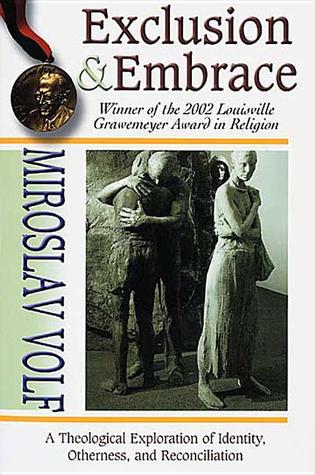 So, believing and belonging and making one’s faith one’s own within a community of strong conviction is a complex dance and it doesn’t always go well; I think of Miroslav Volf’s sophisticated and important book Exclusion and Embrace: A Theological Exploration of Identity, Otherness, and Reconciliation (Abingdon Press; $28.99.) Who is in and who is out, how we can form vibrant faith communities and honor diversity is complicated and risky and sometimes produces anxiety which can lead to practices that inflict real damage. Some of us tend to err on the side of openness and kindness while others tend to err on the side of strict truths held tightly. It’s admittedly complicated.
So, believing and belonging and making one’s faith one’s own within a community of strong conviction is a complex dance and it doesn’t always go well; I think of Miroslav Volf’s sophisticated and important book Exclusion and Embrace: A Theological Exploration of Identity, Otherness, and Reconciliation (Abingdon Press; $28.99.) Who is in and who is out, how we can form vibrant faith communities and honor diversity is complicated and risky and sometimes produces anxiety which can lead to practices that inflict real damage. Some of us tend to err on the side of openness and kindness while others tend to err on the side of strict truths held tightly. It’s admittedly complicated.
New data keeps coming out about those who are leaving faith (sometimes, but not always, disgruntled or hurt from toes stepped on during this complicated dance.) Recently Group published Church Refugees: Sociologists Reveal Why People Are Done with Church But Not Their Faith by Josh Packard (Group; $14.99) about folks who have left church and The Barna Group released Churchless: Understanding Today’s Unchurched and How to Connect with Them (Tyndale; $15.99.) This winter I re-read most of 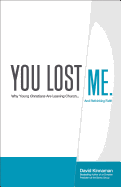 You Lost Me: Why Young Christians Are Leaving Church . . . and Rethinking Faith by David Kinnaman (Baker; $15.99) and was reminded again of how important it is, how I wish a handful of folks in every church would read it and discuss its proposals for retaining young adults in the life of the church. Or gather to watch the DVD which is very good. His previous book, co-written with Gabe Lyon, UnChristian: What a New Generation Really Thinks about Christianity… and Why It Matters (Baker; $15.99) is well worth reading as it was one of the groundbreaking bits of research (released just five years ago) of what young adults thought about Christianity. And, yes, some of the perception is that Christianity teaches stuff that is bigoted, unsavory, unkind, untrue.
You Lost Me: Why Young Christians Are Leaving Church . . . and Rethinking Faith by David Kinnaman (Baker; $15.99) and was reminded again of how important it is, how I wish a handful of folks in every church would read it and discuss its proposals for retaining young adults in the life of the church. Or gather to watch the DVD which is very good. His previous book, co-written with Gabe Lyon, UnChristian: What a New Generation Really Thinks about Christianity… and Why It Matters (Baker; $15.99) is well worth reading as it was one of the groundbreaking bits of research (released just five years ago) of what young adults thought about Christianity. And, yes, some of the perception is that Christianity teaches stuff that is bigoted, unsavory, unkind, untrue.
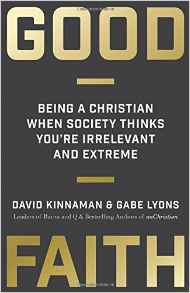 Their major release just a year ago, Good Faith: Being a Christian When Society Thinks You’re Irrelevant and Extreme (Baker; $19.99) tries to answer the question of how to present a good faith – historically orthodox but gracious and winsome – in a culture were (as their research powerfully shows) many think that anyone who admits to religious faith is, by definition, an extremist. What does good faith look like in these days, with this sort of perception out there, and how can we nurture such good faith?
Their major release just a year ago, Good Faith: Being a Christian When Society Thinks You’re Irrelevant and Extreme (Baker; $19.99) tries to answer the question of how to present a good faith – historically orthodox but gracious and winsome – in a culture were (as their research powerfully shows) many think that anyone who admits to religious faith is, by definition, an extremist. What does good faith look like in these days, with this sort of perception out there, and how can we nurture such good faith?
Even among those who aren’t leaving church there is, in our day, a new eagerness to explore fresh options for faith; many people are restless and unhappy with their faith experiences, it seems. This could be seen as a good thing – folks yearning for truth, seeking a faith that makes sense, aligning seriously with new faith communities (The aforementioned Rod Dreher himself, was once Roman Catholic and is now famously Eastern Orthodox; Carol Howard Merritt was raised a strict fundamentalist/Pentecostal but is now identifies with the progressive wing of what many consider a liberal denomination.) I like to recommend Journeys of Faith: Evangelicalism, Eastern Orthodoxy, Catholicism, and Anglicanism edited by Robert Plummer (Zondervan; $18.99) to those who are interested in how this developing, at least in some circles. It tells the faith stories of authors who were evangelical but ended up Episcopalian, Anglicans drawn to Orthodoxy, Catholics who become evangelicals. Jon Sweeney, a very good writer with decades of experience in the religious publishing world, has examined interfaith marriages in his fascinating Mixed Up Love: Relationships, Family, and Religious Identity in the 21st Century (Jericho; $15.00.) Like it or not, this pluralistic world is a thing.
 Carol Merritt’s Healing Spiritual Wounds: Reconnecting with a Loving God After Experiencing A Hurtful Church however, is more than an interesting study of pluralizing culture and changes in the broader Christian community or one more study of why people get disgruntled with church and drop out or change congregations. It is, rather, an urgent, heart-felt, perhaps even at times understandably shrill, call for the church — which, I suppose, means actual Christian people, especially leaders, running churches like yours and mine — to recognize that we are hurting people. Sometimes quite knowingly, sometimes less intentionally, our lack of emotional intelligence, our pushy ways, and our lack of sensitivity for those with doubts and concerns and disagreements, have driven people away. Those who insist on literal readings of the Bible are off base and hurting many. As Lyon & Kinnaman remind us, our faith is not always offered “in good faith” and sometimes, sadly, our words and belief systems that we think are inspiring and water-tight turn sour and disturbing. There is, it seems, not only a crisis of a lack of Christian conviction in our culture, but in a sense, the opposite. We are awash in faith that is too strict, too certain, to dogmatic, too ideological, which ends up sometimes being presented in ways that are hurtful, even toxic.
Carol Merritt’s Healing Spiritual Wounds: Reconnecting with a Loving God After Experiencing A Hurtful Church however, is more than an interesting study of pluralizing culture and changes in the broader Christian community or one more study of why people get disgruntled with church and drop out or change congregations. It is, rather, an urgent, heart-felt, perhaps even at times understandably shrill, call for the church — which, I suppose, means actual Christian people, especially leaders, running churches like yours and mine — to recognize that we are hurting people. Sometimes quite knowingly, sometimes less intentionally, our lack of emotional intelligence, our pushy ways, and our lack of sensitivity for those with doubts and concerns and disagreements, have driven people away. Those who insist on literal readings of the Bible are off base and hurting many. As Lyon & Kinnaman remind us, our faith is not always offered “in good faith” and sometimes, sadly, our words and belief systems that we think are inspiring and water-tight turn sour and disturbing. There is, it seems, not only a crisis of a lack of Christian conviction in our culture, but in a sense, the opposite. We are awash in faith that is too strict, too certain, to dogmatic, too ideological, which ends up sometimes being presented in ways that are hurtful, even toxic.
There have been books about “spiritual abuse” and “toxic faith” from evangelical publishers for decades. (See, for instance, Toxic Faith: Experiencing Healing Over Painful Spiritual Abuse by Stephen Arterburn [Shaw Books; $15.99.]) The spurt of attention to tyrannical and abusive cults in the 1980s created an awareness of the dangers heavy-handed leaders with peculiar Bible teachings. In some charismatic circles a “shepherding” movement developed that in some circles became authoritarian and, in some places, cult-like. That some of these very folks ended up leading respected evangelical churches was, some of us thought, a sign of maturing and growing out of such excessive stuff. But in some cases we were wrong, as some of these characters – even as they wrote books and appeared on stages among reputable ministry organizations and were supported by nationally known leaders – ran churches that were covering up abuse, even sexual abuse scandals. Apparently the Roman Catholic churches were not the only ones covering up dysfunctional clergy and abusive leaders and toxic faith.
Carol Howard Merritt’s new book is, therefore, very important since part of the defining nature of religion in our time is – Lyons and Kinnaman, again – perceived as extremist and is, in fact, often hurtful. Your church and mine may not be seen that way and we may even be working hard to offer a graceful and properly inclusive faith community, but the church refugee problem is everywhere. The fallout is real; we see it in our store and you most likely see it in your own circle of friends at work or church. Carol’s book is like a report from the crows nest, crying out what she is seeing, or, perhaps, to change the image, it is a report from the trenches, where she does battle day by day for the sanity and humanity of dear people scarred by bad religion. Healing Spiritual Wounds is a cry of the heart, a painful book, and a good step for some towards healing. I think it should be read by church leaders of all sorts to remind us of this sad consequence of misguided religious fervor. But the book is mostly for those hurt by bad faith. It is a guide for healing and hope and recovery. We think it is important, moving, helpful.
Let me tell you three reasons why.
IT IS FULL OF STORIES
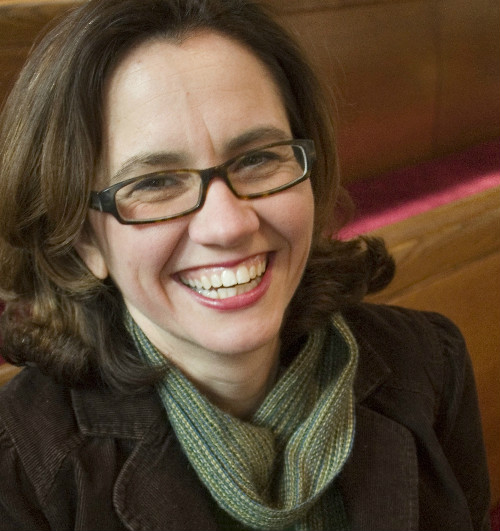 Healing Spiritual Wounds is full of stories, well told and often painful testimonials of folks who have gone through hurtful stuff. Much of this is grounded in Merritt’s own narrative, making this nearly a spiritual memoir. She tells of her own journey in a pretty strict church, in a complicated family, with a violent father. She reveals something else significant about her father later in the book – I don’t want to spoil the literary power of his one small reveal – but she is both empathetic and remains resolute to not justify domestic violence, let alone religious-motivated violence. She writes well about parts of her life and it is at times riveting, sometimes anguishing, sometimes entertaining.
Healing Spiritual Wounds is full of stories, well told and often painful testimonials of folks who have gone through hurtful stuff. Much of this is grounded in Merritt’s own narrative, making this nearly a spiritual memoir. She tells of her own journey in a pretty strict church, in a complicated family, with a violent father. She reveals something else significant about her father later in the book – I don’t want to spoil the literary power of his one small reveal – but she is both empathetic and remains resolute to not justify domestic violence, let alone religious-motivated violence. She writes well about parts of her life and it is at times riveting, sometimes anguishing, sometimes entertaining.
Her fascinating part about a big dress code “fashion show” for first year women at Moody Bible College, where she attended in the early 1980s, would have been hilarious if not so awful in sexist consequence. Her telling of the blunt professor in an ethics class there – who insisted that if one were hiding Jews in one’s basement during the Nazi holocaust in Germany, the proper Christian response would be to be honest, first, and turn the Jews over. I shudder to think of the fall out of this kind of strident, legalistic fundamentalism (and pray that Moody is not now mired in such an ethos.)
That bit about Moody’s weird fashion show implying so much about gender and power works as a fabulously rich memory and she plumbs the sexism there, but moves to a deeper consideration, and the chapter on the body is worth the price of the book. From our tendency to blame women in instances of sexual abuse – and she tells of a powerful, if brief, episode of assault on her own body on a public street where she jumps in her own mind to the blouse she is wearing — to our on-going struggle to see how Christian faith is also material, this worldly, not-laden with Gnostic disdain for creational realities like bodies and sex and stuff, it is my sense that reading about a theology of the body is always important. Her stories here are potent (including a tale of a woman who was involved in marital infidelity who she treated with understanding and grace), her insight valuable (including a feminist critique of Augustine’s view of women, which rings true), her reflective questions surely generative for anyone wrestling with body image, sexuality, shame or who hosts awkwardness about the notion that God loves them, even in their bodies and desires and brokenness. I was very deeply moved as she told about using Thistle Farms oil to anoint the bodies of the walking wounded. (The incredible story of Becca Stevens and her recovery from abuse and her ministry among marginalized and abused women at Thistle Farms is beautifully told in a book we’ve often promoted, Snake Oil: The Art of Healing and Truth-Telling (Jericho Books; $15.00) and we were glad to see Carol describe it.
Merritt has lived a colorful life and has worked hard to learn to tell it well. I know she has worked on this book a long time and, to be honest, I found the writing better and better as the book unfolded. So this is one good reason many will like this book – it is full of memoir-ish insights telling of her life and her ministry, listening well to people and their God-haunted stores. The episodes carry powerful truths but it is so interesting. Anyone who cares about people should want to hear these tales, sad as many are. It is nicely done in this regard.
Brian McLaren mirrors my evaluation when he says it is “Emotionally intense, beautifully written, and courageously honest. Healing Spiritual Wounds helped me.” Two other reviewers – Writing to God author Rachel Hackenberg and the funny, popular, Jesuit, James Martin — both called it “wise” and “gentle.”
Edward Blum – I hope you know his scholarly work The Color of Christ — says of it:
Merritt is the honest voice, the thoughtful voice, the inviting voice, the justice voice, the personable voice that my spirit has yearned to hear. I grow closer to God and humanity as I read each page.
THERE ARE REFLECTION QUESTIONS AND EXERCISES FOR HEALING AND RECOVERY
A second reason to get this book is because at the end of each chapter there are remarkable reflection questions and interactive exercises that can help readers process the material. I am not a big fan of doing this kind of thing but I really think that in this case this could be very, very, helpful for some. Which is to say that Healing Spiritual Wounds is not just a book complaining about fundamentalist strictness or warning about heavy-handed religion or railing against vengeful images of God. It is a book that is designed to help, to be a tool for those who have bruised spirits and hurt souls.
One writer (Meredith Gould, author of Desperately Seeking Spirituality) says it “provides validation and comfort for anyone feeling alone within or abandoned by the church.” But then Gould offers the clincher recommendation: “Healing Spiritual Wounds is a generous guide to reconnecting with a loving God.” That is the hope so evident within this book. Even though this is a well-written hardback memoir – at times you might think of Accidental Saints by Nadia Bolz-Weber or even Leaving Church by Barbara Brown Taylor or Searching for Sunday by Rachel Held Evans – it is mostly a handbook of help. The suggestions that come up throughout the book and the insights offered and then the pages and pages of prompts and guides to work on one’s issues are sure to be a boon to anyone wanting a measure of hope and healing on their rocky road.
And let me be sure to explain that even though Merritt is an outspoken voice within mainline churches who has been an advocate for the marginalized, this book is about more than unsupportive postures within the church against gays and lesbians or hurtful teachings about women and men and restrictive  gender roles. Granted, she used her blog at the Christian Century to rail against the award being given by Princeton Theological Seminary to Timothy Keller who, as she saw it, was hostile to the basic theological task of PTS which includes preparing women and members of the LGTBQ+ community for Christian ministry and ordination. (I wrote about that in a previous BookNotes newsletter, trying to respect both those who disagree with Keller’s view, as I do, and to yet affirm his mostly excellent contributions for which the Kuyper Award was to have been given.) But my point here is that Healing Spiritual Wounds is not only, or not even mostly, about this kind of faith which she names as toxic that excludes gays and women from leadership. This is part of her agenda, of course, but the book covers much, much, more.
gender roles. Granted, she used her blog at the Christian Century to rail against the award being given by Princeton Theological Seminary to Timothy Keller who, as she saw it, was hostile to the basic theological task of PTS which includes preparing women and members of the LGTBQ+ community for Christian ministry and ordination. (I wrote about that in a previous BookNotes newsletter, trying to respect both those who disagree with Keller’s view, as I do, and to yet affirm his mostly excellent contributions for which the Kuyper Award was to have been given.) But my point here is that Healing Spiritual Wounds is not only, or not even mostly, about this kind of faith which she names as toxic that excludes gays and women from leadership. This is part of her agenda, of course, but the book covers much, much, more.
For instance, there are chapters about our unhelpful and hurtful views of money that we may have absorbed through weird church teaching or attitudes. (That chapter and its exercises is called “Reassessing Our Finances” and is liberating and very helpful for anyone struggling with this aspect of our lives.) Further, the book includes a chapter on damaged emotions and a chapter called “Healing Our Images of God.” The chapter “Redeeming Our Broken Selves” is thoughtful and the one called “Reclaiming our Hope” should prove useful to many. With its overview piece called “Finding Shalom” and its concluding chapter “Being Born Again” I think this is book going to be reassuring to many. It covers a lot of ground and although it may first appeal to those who have been abused by toxic churches or deeply confused by weird religion, I think it could be found useful to many of us ordinary folks in fairly ordinary churches who just feel unsettled by some popular religious talk or who are squeamish about some attitudes or practices with which we are familiar.
Healing… really does cover many topics and considerable ground and I think anyone who does counseling or pastoral caregiving or evangelism would find many of the chapters helpful from time to time. That is, it should have wider appeal than just for those who are deeply hurt by harsh churches. lt might be a good resource for most of us, actually…
CREATIVE THEOLOGICAL REFLECTION
Thirdly, besides being a captivating memoir and a useful manual full of helpful ideas for healing steps, Healing Spiritual Wounds is an example of done-on-the-run, creative, contemporary theology. We are seeing this more, these days (and it is generally a good thing, I think), finding theologians who are working in the pews and streets and homes, hammering out their views in blogs, not primarily in the quiet halls of the academy. Some of the creative theology coming out has this urgent, and perhaps provisional feel. I find some of her theological evaluations and formulations a bit too progressive for my evangelical tastes, but I will propose that this really is a valuable resource as part of the puzzle of formulating a sturdy and life-giving faith.
Her goal, of course, is not just to heal spiritual wounds by standing with the victims of dumb religion -all that is a good step, always, what the liberation theologians used to call accompaniment, or what Henri Nouwen decades ago called the spirituality of presence and how we can all become “wounded healers.” But more than just good solidarity, Merritt offers those hurt by toxic faith something better — a way to re-formulate faith, to re-imagine how we understand the Bible, a way to recover a loving and life-giving faith, new images of God that are more viable. She doesn’t offer final answers but points us in a good direction, thinking about the character of God, the glimmers of hope and goodness that can be seen if one is offered a gracious worldview, a view of God and trust and flourishing that is life-giving, abundant, and bears good fruit. This is good news for the hurting, a step towards healing for those confused and worn down by images of judgement and wrath and vengeance and rules and shame.
Maybe you or someone you know was hurt by the church and if so, this book could help. Maybe you know those who have been excluded due to sexism or have been mistreated because they are gay or lesbian or trans. This book invites any and all to the table, assuring us that God is gracious and good and that faith can be a portal to a deep relationship with a redeemer who is merciful and just, good and beautiful, comforting and transforming.
Consequently, I think this is a tool not just for those who have been hurt by harsh or exclusive churches that proclaim a less than really good gospel, but I think it could be useful for any of us who need an introduction or reminder of a liberating faith rooted in this sort of open and affirming faith. God is not 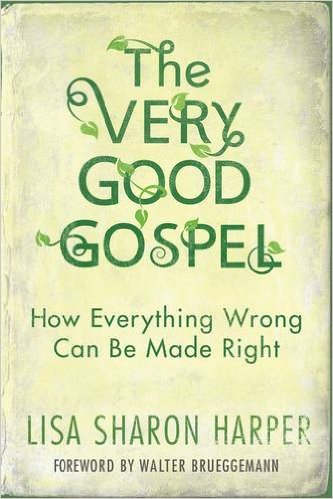
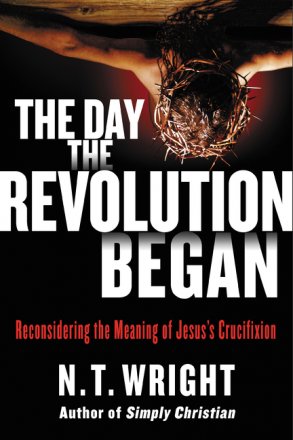 out to get you, and we have to formulate our creeds and doctrines in ways that are consistent with the gospel itself.
out to get you, and we have to formulate our creeds and doctrines in ways that are consistent with the gospel itself.
(This is a bit too far afield for this short review of Merritt’s book, but I would suggest that many good scholars are doing this kind of generative work and she might have included some allusion to them to make her book a bit more sturdy. For instance, I’ve described here how N.T. Wright in his The Day the Revolution Began: Rediscovering the Meaning of Jesus’ Crucifixion (HarperOne; $28.99) is trying to formulate the New Testament teachings about the cross in light of the doctrine of “new creation” and I’ve often exclaimed how much I like the easy-to-read but powerfully tweaking of evangelical faith in Lisa Sharon Harper’s Very Good Gospel: How Everything Wrong Can Be Made Right (Waterbrook; $19.99.)
The number of books on our bookstore shelf about grace continues to expand and titles about treating others graciously are ubiquitous these days. A few of the big spokespersons for this theme run churches that are less than welcoming to some, I’ve heard, and we all have a way to go, I think, to learn more what deep hospitality looks like. But there are great books to help us be more deeply aware of the freedom we have in Christ, free to be gracious. Just for instance, I think of Scott 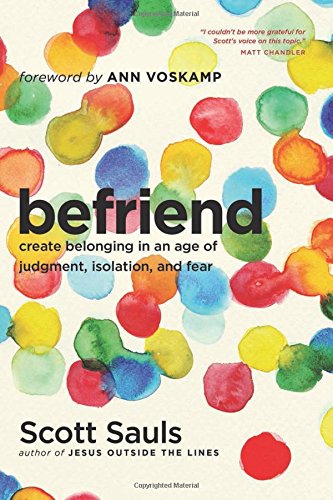 Sauls wonderful Befriend: Create Belonging in an Age of Judgement, Isolation, and Fear (Tyndale; $15.99) or Steve Brown’s book called Three Free Sins: God’s Not Mad at You (Howard Books; $14.99) or Margot Starbuck’s wonderfully-written Not Who I Imagined: Surprised by a Loving God (Baker; $14.99.) Jonathan Merritt (no relation to Carol, by the way) has a fantastic, moving set of pieces in Jesus Is Better Than You Imagined (FaithWords; $20.00.) Carol Merritt might have been wise to connect her therapeutic efforts and progressive effort to re-imagine faith with these other less dramatic resources, rooting her within the on-going conversation among evangelicals that are working for similar goals.)
Sauls wonderful Befriend: Create Belonging in an Age of Judgement, Isolation, and Fear (Tyndale; $15.99) or Steve Brown’s book called Three Free Sins: God’s Not Mad at You (Howard Books; $14.99) or Margot Starbuck’s wonderfully-written Not Who I Imagined: Surprised by a Loving God (Baker; $14.99.) Jonathan Merritt (no relation to Carol, by the way) has a fantastic, moving set of pieces in Jesus Is Better Than You Imagined (FaithWords; $20.00.) Carol Merritt might have been wise to connect her therapeutic efforts and progressive effort to re-imagine faith with these other less dramatic resources, rooting her within the on-going conversation among evangelicals that are working for similar goals.)
By the way, just for fun, here Jonathan Merritt conducts an informative interview with Carol Howard Merritt about her book and work at his RNS column.
And so, there you have it: three reasons why we recommend Healing Spiritual Wounds: Reconnecting with a Loving God After Experiencing a Hurtful Church.
To summarize:
First, it is an entertaining read, passionately written including well told stories of real life. Those who want a glimpse into the faith journey of Ms Merritt and her colorful past and her recent ministry of caring for those hurt by religion will find her book captivating.
Secondly, it is a book that actually gives us fresh ideas of what to do about our hurts, the residual negative effects of excessively harsh religion. The exercises are experiential and the reflection questions could provide journaling material for weeks and weeks. After the well-written stories, the interactive suggestions make this a workbook, almost, a manual to help you on your journey. This is not abstract or only a manifesto, it is a resource for real people, a guide to helping the hurting. If you are doubtful that such a book is necessary, I especially urge you to consider it.
Thirdly, Healing Spiritual Wounds is an example of the sorts of progressive theology that is being written these days — informed by serious thinkers (she quotes Karl Barth and Serene Jones and James Cone and Sallie McFague) — designed to make sense of the Bible and the Christian faith in our times. Her apparent sense that older ways alone of explaining the faith are not helpful is one that I have mixed feelings about and, again, may have wished she had made a few other moves and drawn on a few other works. I have great sympathies for her project but worry about the trajectory, perhaps. But that’s okay; it is a good example of the generative kinds of pastoral theology that younger thinkers, especially women, are offering for our consideration. If you’ve read Brian McLaren’s The Great Spiritual Migration or Diana Butler Bass’s Grounded or, say, the good books by Sarah Bessey, you will see some of the strengths and possible weaknesses of Merritt’s approach. For those wanting to take up the task of doing on-going theological work to say again what we must always say again, this book will be useful.
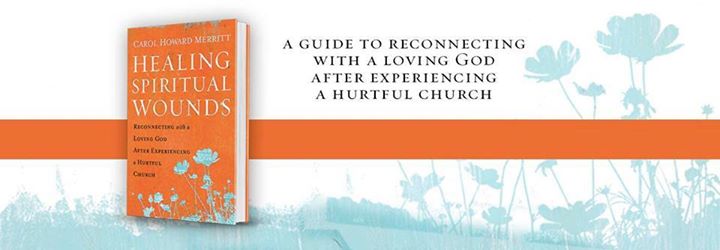
Okay, suppose we want to have somewhat of a panel discussion to round out with some further conversation the passionate insight and guidance offer by Carol Howard Merritt.
Here are some voices to add to the discussion.
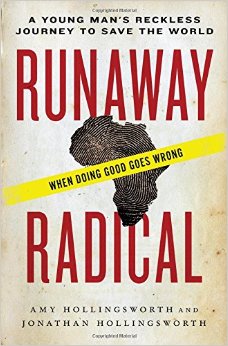 Runaway Radical: When Doing Good Goes Wrong Amy Hollingsworth and Jonathan Hollingsworth (Thomas Nelson) $15.99 I have reviewed this before and recommend it often. It is a riveting story of “a young man’s reckless journey to save the world” inspired, as he was, by passionate leaders, popular books, serious views of radical discipleship and a demanding God (even if what was demanded was social justice, simple living, and a global concern.) Much good is perverted by harsh leaders and legalistic readings, and this fascinating memoir — co-written in alternating chapters by a son and his mother — tells of distorted expectations, a missionary calling that goes awry, a faith almost lost, and a very, very corrupt, authoritarian church. Wow.
Runaway Radical: When Doing Good Goes Wrong Amy Hollingsworth and Jonathan Hollingsworth (Thomas Nelson) $15.99 I have reviewed this before and recommend it often. It is a riveting story of “a young man’s reckless journey to save the world” inspired, as he was, by passionate leaders, popular books, serious views of radical discipleship and a demanding God (even if what was demanded was social justice, simple living, and a global concern.) Much good is perverted by harsh leaders and legalistic readings, and this fascinating memoir — co-written in alternating chapters by a son and his mother — tells of distorted expectations, a missionary calling that goes awry, a faith almost lost, and a very, very corrupt, authoritarian church. Wow.
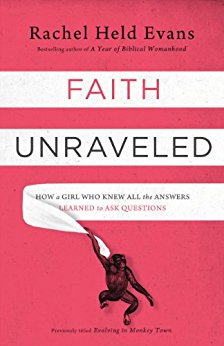 Faith Unraveled: How a Girl Who Knew All The Answers Learned to Ask Questions Rachel Held Evans (Thomas Nelson) $15.99 Evans is somewhat of a poster-girl of young, formerly evangelical women who’s faith journey has been documented on blogs and in books and at conferences, and this, her first, is a great example of coping with styles of strict faith that shuts down questions, and insists on pat answers and social conformity. Evans was raised in the town famous for the Scopes “Monkey Trials” and this is her telling of her coming of age in that milieu, facing trials of her own, and realizing how her own faith had to adapt and evolve if it was to survive. So, yep, this is one good example of less than helpful understandings of evangelical faith and the reflections of a woman whose voice is needed in these kinds of conversations. Previously released as Evolving in Monkey Town.
Faith Unraveled: How a Girl Who Knew All The Answers Learned to Ask Questions Rachel Held Evans (Thomas Nelson) $15.99 Evans is somewhat of a poster-girl of young, formerly evangelical women who’s faith journey has been documented on blogs and in books and at conferences, and this, her first, is a great example of coping with styles of strict faith that shuts down questions, and insists on pat answers and social conformity. Evans was raised in the town famous for the Scopes “Monkey Trials” and this is her telling of her coming of age in that milieu, facing trials of her own, and realizing how her own faith had to adapt and evolve if it was to survive. So, yep, this is one good example of less than helpful understandings of evangelical faith and the reflections of a woman whose voice is needed in these kinds of conversations. Previously released as Evolving in Monkey Town.
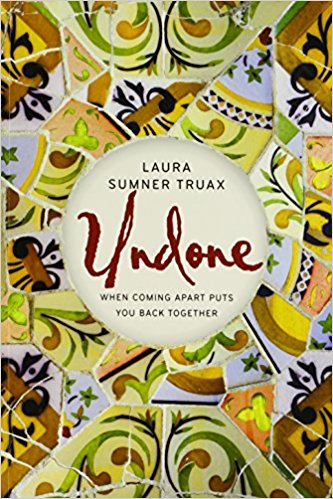 Undone: When Coming Apart Puts You Back Together Laura Sumner Truax (IVP) $15.00 I’ve often commended this moving story about a woman who felt like her life was falling apart, how Scripture and an encouraging community helped her embrace life with its varying joys and sorrows. She is the pastor of a church that Carol Merritt attended for a season that is described in her book and which was influential for her. Honest, raw, this is a story of owning one’s faith, no matter what. It isn’t exactly about being undone by bad views of God or toxic religion, but her hurts and failures and messy life will resonate with anyone who seeks another chance, new ideas, healing examples of getting put back together after deep disappointment.
Undone: When Coming Apart Puts You Back Together Laura Sumner Truax (IVP) $15.00 I’ve often commended this moving story about a woman who felt like her life was falling apart, how Scripture and an encouraging community helped her embrace life with its varying joys and sorrows. She is the pastor of a church that Carol Merritt attended for a season that is described in her book and which was influential for her. Honest, raw, this is a story of owning one’s faith, no matter what. It isn’t exactly about being undone by bad views of God or toxic religion, but her hurts and failures and messy life will resonate with anyone who seeks another chance, new ideas, healing examples of getting put back together after deep disappointment.
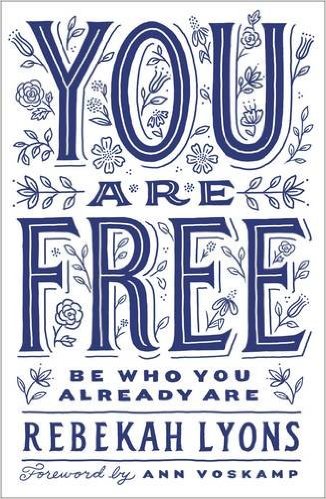 You Are Free: Be Who You Already Are Rebekah Lyons (Zondervan) $19.99 I think if I were convening a rount-table discussion around Carol’s book I’d want Rebekah Lyons there because so much of her new book is just a simple cry for women — and all of us, really — to feel accepted. God loves us, Christ redeems us, we don’t have to fret about what others think (or, what we think) about us. This is a book about freedom and she writes what one author called “an anthem for healing, freedom, and hope.” The ever poetic Ann Voskamp says “Hold these pages like a burning flame in the palm of your hands, like a bit of glowing sun that will grow you into freedom soaring on wind.” So, who doesn’t need a bit of that? I’d recommend Rebekah’s wise book for anyone wanting to grief past disappointments and “discover the courage to begin again — and use your newfound freedom to set others free.” We carry the DVD of this, too, by the way, if you want to gather some folks together and watch her teach this freedom song.
You Are Free: Be Who You Already Are Rebekah Lyons (Zondervan) $19.99 I think if I were convening a rount-table discussion around Carol’s book I’d want Rebekah Lyons there because so much of her new book is just a simple cry for women — and all of us, really — to feel accepted. God loves us, Christ redeems us, we don’t have to fret about what others think (or, what we think) about us. This is a book about freedom and she writes what one author called “an anthem for healing, freedom, and hope.” The ever poetic Ann Voskamp says “Hold these pages like a burning flame in the palm of your hands, like a bit of glowing sun that will grow you into freedom soaring on wind.” So, who doesn’t need a bit of that? I’d recommend Rebekah’s wise book for anyone wanting to grief past disappointments and “discover the courage to begin again — and use your newfound freedom to set others free.” We carry the DVD of this, too, by the way, if you want to gather some folks together and watch her teach this freedom song.
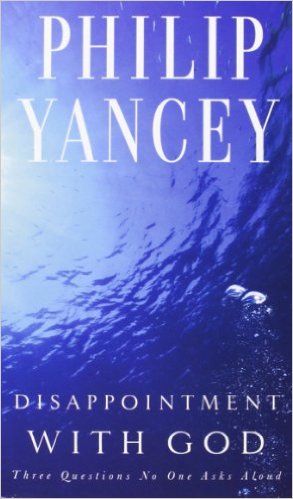
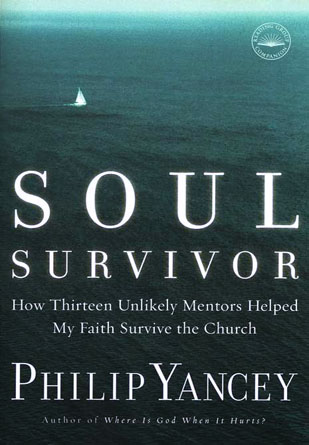 Disappointment with God: Three Questions No One Asks Aloud Philip Yancey (Zondervan) $14.99 I sometimes am reluctant to recommend Yancey just because so many do; he is considered a smart, thoughtful, open-minded evangelical, and like, oh, say, Frederick Beuchner, is an author intelligent folks like. Well, there’s a reason for that: he is often brilliant, really interesting, an excellent writer, and he has a lot to say. I have revisited this over and over and really do recommend it. By the way, he tells of his own struggle to maintain commitment to the faith and to church in his great Soul Survivor: How Thirteen Unlikely Mentors Helped My Faith Survive the Church (Waterbrook) $14.99. His voice and approach — offering great thinkers and leaders with edgy integrity as inspiration for how to heal and why to endure — is a different approach than Merritt’s and would be a good contribution in our strategies to help others recovery from bad church experiences. And I suppose you know his classic What’s So Amazing About Grace. Get a few and give ’em out!
Disappointment with God: Three Questions No One Asks Aloud Philip Yancey (Zondervan) $14.99 I sometimes am reluctant to recommend Yancey just because so many do; he is considered a smart, thoughtful, open-minded evangelical, and like, oh, say, Frederick Beuchner, is an author intelligent folks like. Well, there’s a reason for that: he is often brilliant, really interesting, an excellent writer, and he has a lot to say. I have revisited this over and over and really do recommend it. By the way, he tells of his own struggle to maintain commitment to the faith and to church in his great Soul Survivor: How Thirteen Unlikely Mentors Helped My Faith Survive the Church (Waterbrook) $14.99. His voice and approach — offering great thinkers and leaders with edgy integrity as inspiration for how to heal and why to endure — is a different approach than Merritt’s and would be a good contribution in our strategies to help others recovery from bad church experiences. And I suppose you know his classic What’s So Amazing About Grace. Get a few and give ’em out!
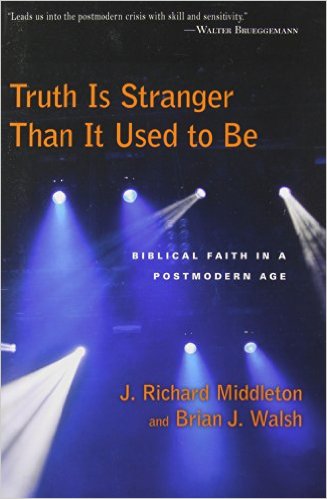 Truth Is Stranger Than It Used to Be: Biblical Faith in a Postmodern Age Brian Walsh & Richard Middleton (IVP Academic) $22.00 Let’s get this said at some point in our round-table conversation: the rise in disaffected folks from conventional religion is at least in some ways a consequence of post-modernity, not to mention the postmodern teachings about the marginalized, the dangers of power, the way those in charge tend to oppress others with their totalizing narratives that squeeze out all others. Not everyone needs to grapple with postmodern philosophers and this huge cultural shift but for those that do, I think this is still the best — and certainly the most Biblical — engagement with that stream of thought and cultural posture. Walsh & Middleton were deeply, deeply touched by the marginalized in their own settings and by listening well to postmodern scholars, the cries from the streets, artists like Bruce Cockburn, and, naturally, the women in their lives who were often less than accepted among male-dominated faith-based institutions, they came to grapple well with the ideas and orientations and opportunities of postmodernism. The heavy last half of the book shows how an opened up understanding of the drama of Scripture — perhaps a la Walter Brueggemann’s The Prophetic Imagination and Israel’s Praise with the potent sub-title “Doxology Against Idolatry and Ideology” — is, in fact, the way to engage our postmodern culture and those soured on conventional arrangements. Brian and his wife, Bible scholar Sylvia Keesmaat, continued this project in their nearly revolutionary Colossians Remixed: Subverting the Empire (IVP Academic; $24.00) which I also think would be very, very helpful for those working their way into more liberating and healthy understandings.
Truth Is Stranger Than It Used to Be: Biblical Faith in a Postmodern Age Brian Walsh & Richard Middleton (IVP Academic) $22.00 Let’s get this said at some point in our round-table conversation: the rise in disaffected folks from conventional religion is at least in some ways a consequence of post-modernity, not to mention the postmodern teachings about the marginalized, the dangers of power, the way those in charge tend to oppress others with their totalizing narratives that squeeze out all others. Not everyone needs to grapple with postmodern philosophers and this huge cultural shift but for those that do, I think this is still the best — and certainly the most Biblical — engagement with that stream of thought and cultural posture. Walsh & Middleton were deeply, deeply touched by the marginalized in their own settings and by listening well to postmodern scholars, the cries from the streets, artists like Bruce Cockburn, and, naturally, the women in their lives who were often less than accepted among male-dominated faith-based institutions, they came to grapple well with the ideas and orientations and opportunities of postmodernism. The heavy last half of the book shows how an opened up understanding of the drama of Scripture — perhaps a la Walter Brueggemann’s The Prophetic Imagination and Israel’s Praise with the potent sub-title “Doxology Against Idolatry and Ideology” — is, in fact, the way to engage our postmodern culture and those soured on conventional arrangements. Brian and his wife, Bible scholar Sylvia Keesmaat, continued this project in their nearly revolutionary Colossians Remixed: Subverting the Empire (IVP Academic; $24.00) which I also think would be very, very helpful for those working their way into more liberating and healthy understandings.
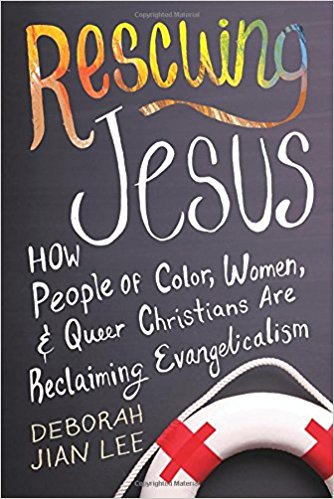 Rescuing Jesus: How People of Color, Women, & Queer Christians Are Reclaiming Evangelicalism Deborah Jian Lee (Beacon Press) $26.95 Yes, Deborah Lee should be at this conversation as she has listened well — for years, all over the country, as she was writing this book. She embraced evangelical faith as a youth and matured in faith in her college years. Slowly, though, she came to have that faith eroded by the injustices and inconsistencies she witnesses within the evangelical young adult campus ministry cultures at college and elsewhere. After leaving the faith, though, she couldn’t shake this sense that things are changing within evangelicalism as people on the margins — women, people of color and LGBTQ persons — are seen and sometimes heard. As I said when I awarded this one of the Best Books of 2016, I found it deeply moving, an extraordinary read and, agree or not with her evaluations, the stories of people in this book are stories that must be taken seriously. I am grateful for her work; here’s hoping she herself might find a refreshed sort of Christian experience. Perhaps she is the sort of person who might benefit from Carol’s book.
Rescuing Jesus: How People of Color, Women, & Queer Christians Are Reclaiming Evangelicalism Deborah Jian Lee (Beacon Press) $26.95 Yes, Deborah Lee should be at this conversation as she has listened well — for years, all over the country, as she was writing this book. She embraced evangelical faith as a youth and matured in faith in her college years. Slowly, though, she came to have that faith eroded by the injustices and inconsistencies she witnesses within the evangelical young adult campus ministry cultures at college and elsewhere. After leaving the faith, though, she couldn’t shake this sense that things are changing within evangelicalism as people on the margins — women, people of color and LGBTQ persons — are seen and sometimes heard. As I said when I awarded this one of the Best Books of 2016, I found it deeply moving, an extraordinary read and, agree or not with her evaluations, the stories of people in this book are stories that must be taken seriously. I am grateful for her work; here’s hoping she herself might find a refreshed sort of Christian experience. Perhaps she is the sort of person who might benefit from Carol’s book.
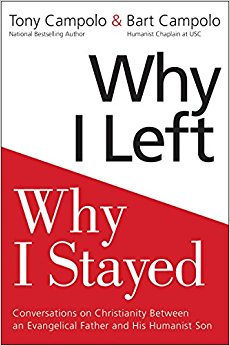 Why I Left, Why I Stayed: Conversations on Christianity Between an Evangelical Father and His Humanist Son Tony Campolo & Bart Campolo (HarperOne) $24.99 These two might add insight to our conversation, and certainly they bring a unique perspective. Campolo, as you know, is an evangelical with progressive leanings and in recent years his son, Bart, could no longer intellectually accept the tenants of the Christian faith. I’m not sure Bart was hurt by Christians, but he just found the core essentials of Christianity no longer tenable. He is now a humanist chaplain at a big college, offering some sort of pastoral, ethical guidance to those who are not aligned with a more conventional religion. This new book is a powerful back and forth, heartbreaking and raw, honest and thought-provoking. There is much to be learned here for those who have the ears to hear.
Why I Left, Why I Stayed: Conversations on Christianity Between an Evangelical Father and His Humanist Son Tony Campolo & Bart Campolo (HarperOne) $24.99 These two might add insight to our conversation, and certainly they bring a unique perspective. Campolo, as you know, is an evangelical with progressive leanings and in recent years his son, Bart, could no longer intellectually accept the tenants of the Christian faith. I’m not sure Bart was hurt by Christians, but he just found the core essentials of Christianity no longer tenable. He is now a humanist chaplain at a big college, offering some sort of pastoral, ethical guidance to those who are not aligned with a more conventional religion. This new book is a powerful back and forth, heartbreaking and raw, honest and thought-provoking. There is much to be learned here for those who have the ears to hear.
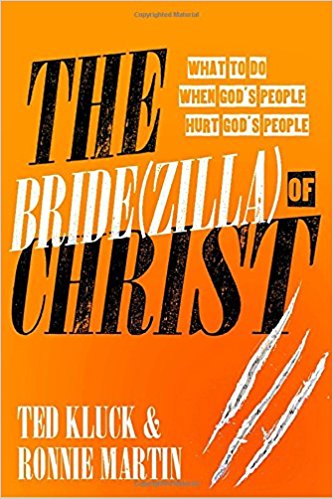 The Bride(zilla) of Christ Ted Kluck & Ronnie Martin (Multnomah) $15.99 This has a different tone — upbeat, clever, and quite theologically evangelical — but is nonetheless honest about the wounds inflicted by the church and steps we can take to move forward in those times when the church hurts. There is much mercy here, good stuff about hope and grace. Kluck teaches at Union University in Tennessee and has worked in sports journalism; Ronnie Martin has been a pastor in small town Pennsylvania and Ohio and previously was known in the Christian music scene, doing electronica music under the name Joy Electric. They know this is serious stuff, but how ’bout that title, eh?
The Bride(zilla) of Christ Ted Kluck & Ronnie Martin (Multnomah) $15.99 This has a different tone — upbeat, clever, and quite theologically evangelical — but is nonetheless honest about the wounds inflicted by the church and steps we can take to move forward in those times when the church hurts. There is much mercy here, good stuff about hope and grace. Kluck teaches at Union University in Tennessee and has worked in sports journalism; Ronnie Martin has been a pastor in small town Pennsylvania and Ohio and previously was known in the Christian music scene, doing electronica music under the name Joy Electric. They know this is serious stuff, but how ’bout that title, eh?
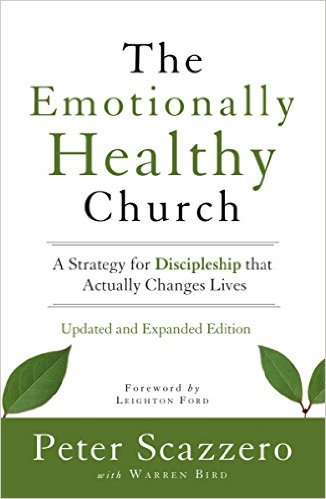 The Emotionally Healthy Church: A Strategy for Discipleship that Actually Changes Lives Peter Scazzero (Zondervan) $22.99 Yes, yes, most Christians do want to be transformed by Christ and we want to be eager disciples, not just casual church attendees. This book invites us, as so many do, to find the power and programming to actually help folks grow in their faith. But here’s the thing: we need healthy people to create healthy communities. This is a very important book, balanced, clear, helpful; it’s not terribly sophisticated or heavy. Fostering some emotional intelligence and becoming more of a safe place won’t prevent all hurtful ideas, but it is a good start, no? See also his Emotionally Healthy Leader, Emotionally Healthy Spirituality and Geri Scazzero’s Emotionally Healthy Woman. I think Peter and Geri Scazzero have something to teach us, a bit more than “common sense” and needed today.
The Emotionally Healthy Church: A Strategy for Discipleship that Actually Changes Lives Peter Scazzero (Zondervan) $22.99 Yes, yes, most Christians do want to be transformed by Christ and we want to be eager disciples, not just casual church attendees. This book invites us, as so many do, to find the power and programming to actually help folks grow in their faith. But here’s the thing: we need healthy people to create healthy communities. This is a very important book, balanced, clear, helpful; it’s not terribly sophisticated or heavy. Fostering some emotional intelligence and becoming more of a safe place won’t prevent all hurtful ideas, but it is a good start, no? See also his Emotionally Healthy Leader, Emotionally Healthy Spirituality and Geri Scazzero’s Emotionally Healthy Woman. I think Peter and Geri Scazzero have something to teach us, a bit more than “common sense” and needed today.
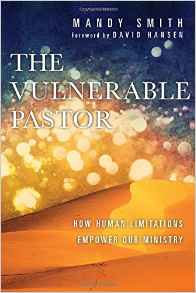 The Vulnerable Pastor: How Human Limitations Empower Our Ministry Mandy Smith (IVP) $16.00 I think that sometimes pastors are particularly hurtful — at least in some of the stories we hear — as they are necessarily authority figures and formative for their flock. Humility is important, but it seems that Smith — herself a successful pastor of a church in Cincinnati — is on to something here by insisting, firstly, that “pastors are human, too” and that sharing vulnerability, admitting limits and failures and weakness, opens up a generative space for real faith development to occur. We don’t need clergy with all the answers or authoritarian teachers who tell us what to believe. We need people of integrity to walk with us in our brokenness, modeling a Christ-like faith. This is a great book and would go a long way to heal the harsh view some have of Christian leaders.
The Vulnerable Pastor: How Human Limitations Empower Our Ministry Mandy Smith (IVP) $16.00 I think that sometimes pastors are particularly hurtful — at least in some of the stories we hear — as they are necessarily authority figures and formative for their flock. Humility is important, but it seems that Smith — herself a successful pastor of a church in Cincinnati — is on to something here by insisting, firstly, that “pastors are human, too” and that sharing vulnerability, admitting limits and failures and weakness, opens up a generative space for real faith development to occur. We don’t need clergy with all the answers or authoritarian teachers who tell us what to believe. We need people of integrity to walk with us in our brokenness, modeling a Christ-like faith. This is a great book and would go a long way to heal the harsh view some have of Christian leaders.
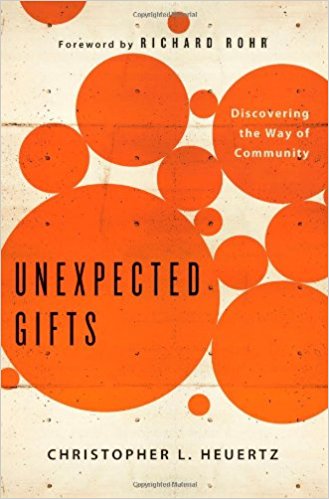 Unexpected Gifts: Discovering the Way of Community Christopher Heuertz (Howard) $14.99 I think any further discussion of Carol’s important book about hurtful faith would have to next explore the nature of Christian community, what it means that we are in this together, and how our betrayals and failures and doubts are part of the mix when one enters into deeper involvement in the lives of faith communities. I don’t think I know a better book that gets at how relationships within our churches and fellowships can be painful, but that staying together can create something beyond the pain. We can take risks being more intentionally commitment to community, receive the gifts that emerge and create something healing and good and beautiful. There are other books on community, on deep healing relationships, on service and trust and intimacy and the adventure of all this. Start here.
Unexpected Gifts: Discovering the Way of Community Christopher Heuertz (Howard) $14.99 I think any further discussion of Carol’s important book about hurtful faith would have to next explore the nature of Christian community, what it means that we are in this together, and how our betrayals and failures and doubts are part of the mix when one enters into deeper involvement in the lives of faith communities. I don’t think I know a better book that gets at how relationships within our churches and fellowships can be painful, but that staying together can create something beyond the pain. We can take risks being more intentionally commitment to community, receive the gifts that emerge and create something healing and good and beautiful. There are other books on community, on deep healing relationships, on service and trust and intimacy and the adventure of all this. Start here.
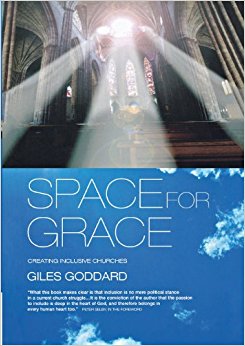 Space for Grace: Creating Inclusive Churches Giles Goddard (Canterbury) $20.99 Why not bring a British voice into this conversation, a Rector in South London who has struggled with this, thought it through, researched much about various models of being both pastoral and prophetic and offering a grace-filled view of the good news within mainline churches. How can we share leadership, treat everyone as equal before God, balance freedom and limits, drawing people from the margins to the center? (Or, as this UK book puts it, the centre.)
Space for Grace: Creating Inclusive Churches Giles Goddard (Canterbury) $20.99 Why not bring a British voice into this conversation, a Rector in South London who has struggled with this, thought it through, researched much about various models of being both pastoral and prophetic and offering a grace-filled view of the good news within mainline churches. How can we share leadership, treat everyone as equal before God, balance freedom and limits, drawing people from the margins to the center? (Or, as this UK book puts it, the centre.)
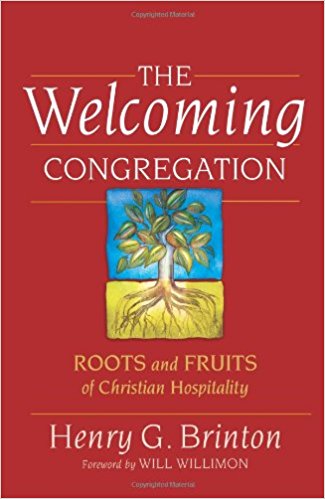 The Welcoming Congregation: Roots and Fruits of Christian Hospitality Henry G. Brinton (WJK) $17.00 There are bunches of books that we stock about hospitality and some are very, very thoughtful, deep, rich. Others are quite practical and lovely. Some are for individuals, others are for congregations. This is one written by a Presbyterian pastor who looks at the “roots” of hospitality” — the Biblical basis, the locations where we must be attentive to be hospitable, how to think about worship and small groups and meals in hospitable ways. Then he looks at the “fruits” which might include reconciliation, outreach, and fresh perceptions, mostly about “the other.” I think if we are reading Carol’s book about the dangers of hostile forms of religion and ways to help others heal from bad experiences with church, this would be a major step towards reforming our churches. Endorsements by thoughtful scholars like Serene Jones and Amy Oden and a moving foreword by Will Willimon.
The Welcoming Congregation: Roots and Fruits of Christian Hospitality Henry G. Brinton (WJK) $17.00 There are bunches of books that we stock about hospitality and some are very, very thoughtful, deep, rich. Others are quite practical and lovely. Some are for individuals, others are for congregations. This is one written by a Presbyterian pastor who looks at the “roots” of hospitality” — the Biblical basis, the locations where we must be attentive to be hospitable, how to think about worship and small groups and meals in hospitable ways. Then he looks at the “fruits” which might include reconciliation, outreach, and fresh perceptions, mostly about “the other.” I think if we are reading Carol’s book about the dangers of hostile forms of religion and ways to help others heal from bad experiences with church, this would be a major step towards reforming our churches. Endorsements by thoughtful scholars like Serene Jones and Amy Oden and a moving foreword by Will Willimon.
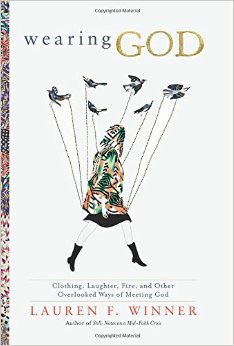 Wearing God: Clothing, Laughter, Fire, and Other Overlooked Ways of Meeting God Lauren Winner (HarperOne) $15.99 You know that we esteem Lauren’s remarkable ability to craft good words into good sentences, and that we read anything she writes. We appreciate her honestly told stories of faith — part memoir, part confession, part teaching — and we’re glad this is out in paperback, offering her insights about various images and metaphors for God. This explains images she finds in the Bible and she not only colorfully describes how these odd-ball images effected her own inner life and faith practices, but how early church, medieval and other mystics down through the ages have used these generative metaphors for the Divine One. Anybody talking about hurtful images of God or bad spiritual teaching or pushy, single-minded churches should spend some time ruminating along with this writer, teacher, and interesting Episcopal priest.
Wearing God: Clothing, Laughter, Fire, and Other Overlooked Ways of Meeting God Lauren Winner (HarperOne) $15.99 You know that we esteem Lauren’s remarkable ability to craft good words into good sentences, and that we read anything she writes. We appreciate her honestly told stories of faith — part memoir, part confession, part teaching — and we’re glad this is out in paperback, offering her insights about various images and metaphors for God. This explains images she finds in the Bible and she not only colorfully describes how these odd-ball images effected her own inner life and faith practices, but how early church, medieval and other mystics down through the ages have used these generative metaphors for the Divine One. Anybody talking about hurtful images of God or bad spiritual teaching or pushy, single-minded churches should spend some time ruminating along with this writer, teacher, and interesting Episcopal priest.
 The Wisdom of Tenderness: What Happens When God’s Fierce Mercy Transforms Our Lives Brennan Manning (HarperSanFranciso) $13.95 Oh yes, if he were still with us, this ragamuffin gospel-lover would add much about views of God, about grace and intimacy and trust and risk and faith and hope. This book — despite the lovely, evocative “tenderness” in the title, is a serious call to real religion. As the Publishers Weekly starred review put it “Maning writes for both the individual and the institution, and both will benefit from listening to his words. Especially for those who long to hear more about divine mercy from the pulpit and see it reflected in their leaders and institutions.”
The Wisdom of Tenderness: What Happens When God’s Fierce Mercy Transforms Our Lives Brennan Manning (HarperSanFranciso) $13.95 Oh yes, if he were still with us, this ragamuffin gospel-lover would add much about views of God, about grace and intimacy and trust and risk and faith and hope. This book — despite the lovely, evocative “tenderness” in the title, is a serious call to real religion. As the Publishers Weekly starred review put it “Maning writes for both the individual and the institution, and both will benefit from listening to his words. Especially for those who long to hear more about divine mercy from the pulpit and see it reflected in their leaders and institutions.”
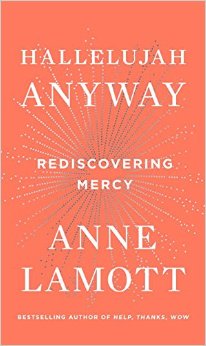 Hallelujah Anyway: Rediscovery Mercy Anne
Hallelujah Anyway: Rediscovery Mercy Anne
Lamott (Riverhead) $20.00 Oh heck, why not? Who wouldn’t want Anne
laughing and calling bullshit on stuff in a panel discussion like this?
She’s such a fun and captivating writer and speaker. We enjoy her books
a lot. This brand new one just released today and it is a lovely little
hardback, to match Stitches and Help, Thanks, Wow. Here’s what she says on the back:
“I’m
not sure I even recognize the ever-presence of mercy anymore, the
divine and human: the messy, crippled, transforming, heartbreaking,
lovely, devastating presence of mercy. But I have come to believe that I
am starving to death for it, and my world is too.”
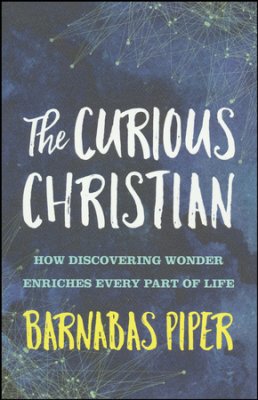
 The Curious Christian: How Discovering Wonder Enriches Every Part of Life Barnabas Piper (Broadman & Holman) $16.99 This author was raised in the home of exceptionally intense theologian/pastor/writer, the controversial John Piper. He tells of some of that in The Pastor’s Kid and has offered wise counsel about doubt in his Help My Unbelief: Why Doubt Is Not the Enemy of Faith. I think in this conversation about hurtful images of faith, I’d invite Barnabas to join in not only because of his own unique experiences in such a passionate home (with such fierce convictions) but because this book offers so much delightful wisdom, so much lovely insight that can counter harsh and unyielding views of faith. His call to wonder, his invitation to ask questions, his spiritual quest for beauty, his insistence that we are all called to deep curiosity, is a transforming counterbalance to those with pat answers, strict rules, unbending data. This nice book is dedicated to his mother. I wonder why some folks are resilient and can continue to be open and eager to learn even if some past experiences have been traumatic? He invites us to continue learning, staying open. Perhaps deeper and more allusive is the fabulous The Sacredness of Questioning Everything by David Dark (Zondervan; $15.99) I bring him to any panel discussion, anytime.
The Curious Christian: How Discovering Wonder Enriches Every Part of Life Barnabas Piper (Broadman & Holman) $16.99 This author was raised in the home of exceptionally intense theologian/pastor/writer, the controversial John Piper. He tells of some of that in The Pastor’s Kid and has offered wise counsel about doubt in his Help My Unbelief: Why Doubt Is Not the Enemy of Faith. I think in this conversation about hurtful images of faith, I’d invite Barnabas to join in not only because of his own unique experiences in such a passionate home (with such fierce convictions) but because this book offers so much delightful wisdom, so much lovely insight that can counter harsh and unyielding views of faith. His call to wonder, his invitation to ask questions, his spiritual quest for beauty, his insistence that we are all called to deep curiosity, is a transforming counterbalance to those with pat answers, strict rules, unbending data. This nice book is dedicated to his mother. I wonder why some folks are resilient and can continue to be open and eager to learn even if some past experiences have been traumatic? He invites us to continue learning, staying open. Perhaps deeper and more allusive is the fabulous The Sacredness of Questioning Everything by David Dark (Zondervan; $15.99) I bring him to any panel discussion, anytime.
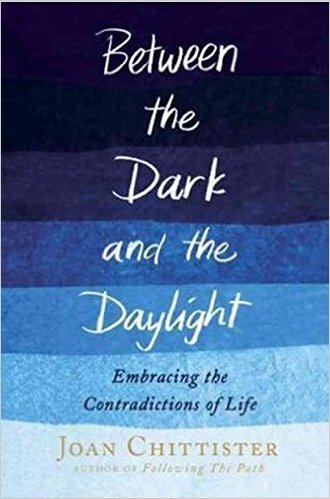 Between the Dark and the Daylight: Embracing the Contradictions of Life Joan Chittister (Image) $20.00 Sister Joan is beloved in many liturgical churches and is admired as a fine writer from within her generous Benedictine tradition. It seems to me she’s always a voice to listen to, but this idea that there are paradoxs at the heart of life, and certainly of faith, could be helpful for many hung up on more rigid systems of belief that they find intolerable. Barbara Brown Taylor says, “Here, at last, is a book for those ready to make peace with the unsolvable riddles of present-day life. Sister Joan has good news for you: these are the questions that make you human, and they can make you more joyously human if you choose.”
Between the Dark and the Daylight: Embracing the Contradictions of Life Joan Chittister (Image) $20.00 Sister Joan is beloved in many liturgical churches and is admired as a fine writer from within her generous Benedictine tradition. It seems to me she’s always a voice to listen to, but this idea that there are paradoxs at the heart of life, and certainly of faith, could be helpful for many hung up on more rigid systems of belief that they find intolerable. Barbara Brown Taylor says, “Here, at last, is a book for those ready to make peace with the unsolvable riddles of present-day life. Sister Joan has good news for you: these are the questions that make you human, and they can make you more joyously human if you choose.”
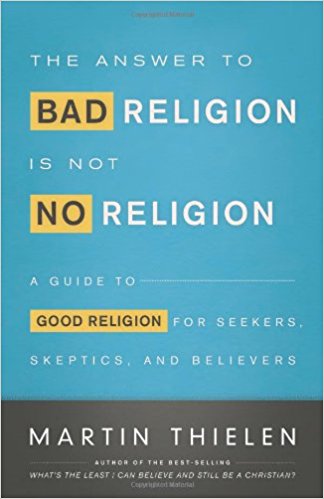 The Answer to Bad Religion Is Not No Religion: A Guide to Good Religion for Seekers, Skeptics and Believers Martin Thielen (WJK) $15.00 I hope you recall us telling of his colorful What’s the Least I Can Believe and Still Be a Christian which differentiates between essential core truths that are pretty much non-negotiable and, well, everything else. Thielen is, like Merritt, concerned about bad religion and here reminds us that “no religion” isn’t the answer. He offers a view of faith that isn’t hurtful or harmful and why we might endure, seeking better spiritual answers and practices. You want a dose of love, grace, forgiveness? You know folks who have been turned off, perhaps almost entirely so? Give this a try or share it with one who might feel that Christianity is more bad news than good.
The Answer to Bad Religion Is Not No Religion: A Guide to Good Religion for Seekers, Skeptics and Believers Martin Thielen (WJK) $15.00 I hope you recall us telling of his colorful What’s the Least I Can Believe and Still Be a Christian which differentiates between essential core truths that are pretty much non-negotiable and, well, everything else. Thielen is, like Merritt, concerned about bad religion and here reminds us that “no religion” isn’t the answer. He offers a view of faith that isn’t hurtful or harmful and why we might endure, seeking better spiritual answers and practices. You want a dose of love, grace, forgiveness? You know folks who have been turned off, perhaps almost entirely so? Give this a try or share it with one who might feel that Christianity is more bad news than good.
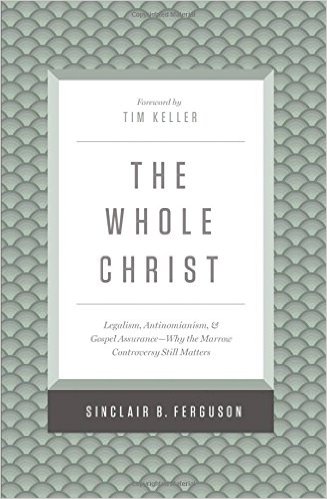 The Whole Christ: Legalism, Antinomianism, and Gospel Assurance–Why the Marrow Controversy Still Matters Sinclair Ferguson (Crossway Books) $24.99 Okay, here me out; I don’t think I’m just being ornery to include this exceedingly weighty tome about an 18th century Scottish Presbyterian controversy. If we’re going to convene a “panel discussion” to explore the insight and wisdom of Carol’s book, we have to sooner or later approach the question of whether her progressive views of God and grace and inclusion that seem so healing and helpful are theologically substantive, Biblically faithful, and how these formulations of faith compare with older more historic views. I don’t know if there is some way to blend her views with, say, historic Reformed thought about guilt and grace, but this book, written by a beloved Scottish theology professor and writer, explores an old controversy about legalism and grace and the role of the law in our spiritual growth. This is heady theological stuff, but some conservative evangelicals have said it is one of the most important books of the decade. Asking questions like this push us to consider first things: what is the gospel? Is talking about God’s good news in these sorts of terms overly harsh? Ferguson is a tough thinker and a kind man. As we journey towards caring for the wounded and offering warm grace to those turned off by toxic faith, we do have to grapple with what these sorts of books have to say. Whew.
The Whole Christ: Legalism, Antinomianism, and Gospel Assurance–Why the Marrow Controversy Still Matters Sinclair Ferguson (Crossway Books) $24.99 Okay, here me out; I don’t think I’m just being ornery to include this exceedingly weighty tome about an 18th century Scottish Presbyterian controversy. If we’re going to convene a “panel discussion” to explore the insight and wisdom of Carol’s book, we have to sooner or later approach the question of whether her progressive views of God and grace and inclusion that seem so healing and helpful are theologically substantive, Biblically faithful, and how these formulations of faith compare with older more historic views. I don’t know if there is some way to blend her views with, say, historic Reformed thought about guilt and grace, but this book, written by a beloved Scottish theology professor and writer, explores an old controversy about legalism and grace and the role of the law in our spiritual growth. This is heady theological stuff, but some conservative evangelicals have said it is one of the most important books of the decade. Asking questions like this push us to consider first things: what is the gospel? Is talking about God’s good news in these sorts of terms overly harsh? Ferguson is a tough thinker and a kind man. As we journey towards caring for the wounded and offering warm grace to those turned off by toxic faith, we do have to grapple with what these sorts of books have to say. Whew.

BookNotes
DISCOUNT
ANY ITEM MENTIONED
10% off
order here
takes you to the secure Hearts & Minds order form page
just tell us what you want
inquire here
if you have questions or need more information
just ask us what you want to know
Hearts & Minds 234 East Main Street Dallastown, PA 17313
717-246-3333
